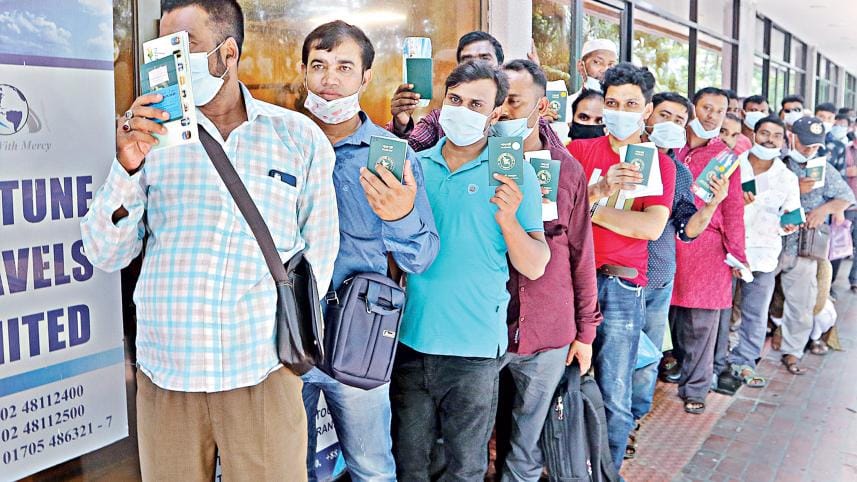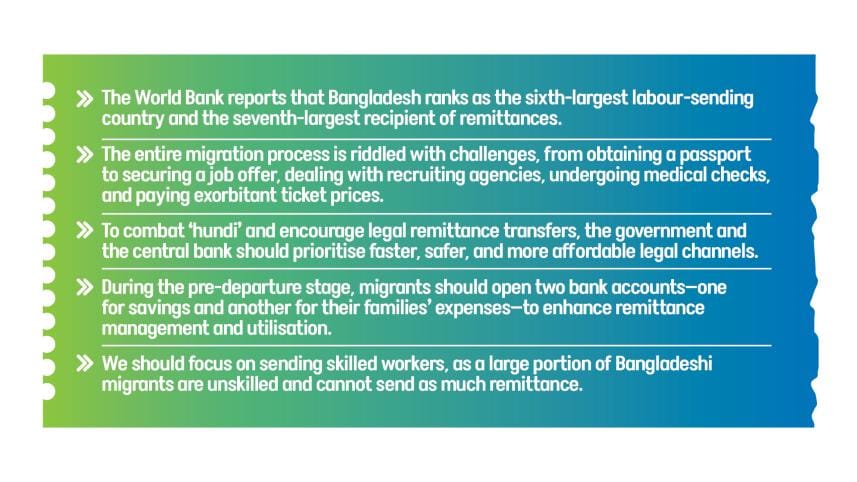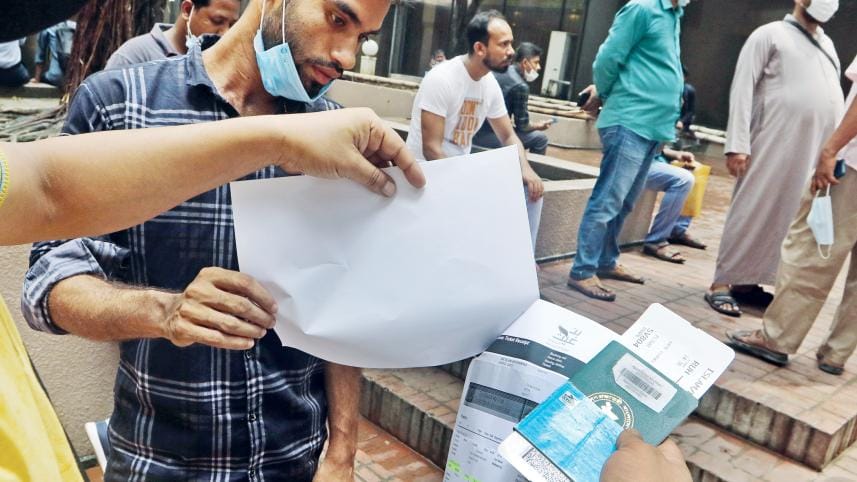Boost remittances by ensuring migrant rights and welfare

Bangladesh received record remittances in 2024. Migrant workers and non-resident Bangladeshis sent a record $26.9 billion in remittances in the past year, providing relief to the country's dollar reserves, particularly in the face of multiple financial and political challenges, including external payment pressures amid dwindling foreign exchange reserves.
Although Bangladeshi migrants suspended sending remittances in July in solidarity with the students' movement against discrimination, they later sent more, and remittances grew by 23 percent compared to 2023.
This positive trend continues in 2025, with expatriate Bangladeshis sending over $1.68 billion during the first 25 days of January. Despite these record-breaking remittance inflows in 2024 and previous years, the government has not taken any significant steps to ensure the rights or welfare of migrants. Instead, they frequently endure significant hardships throughout the migration process—both at home and abroad.

THE SUFFERING OF MIGRANT WORKERS
Most recently, the country witnessed the suffering of 18,000 aspiring migrant workers who could not fly to Malaysia before the May 31 deadline in 2024 due to mismanagement by recruiting agencies and government authorities. Eight months later, these individuals have neither received refunds nor been able to travel. Recently, they protested in Dhaka and formed a human chain to demand justice.
Such issues do not occur only in Malaysia. The entire migration process is riddled with challenges, from obtaining a passport to securing a job offer, dealing with recruiting agencies, undergoing medical checks, and paying exorbitant ticket prices.
In fact, the migration cost from Bangladesh is among the highest in the world, while the earnings remain the lowest. Although the government has fixed the migration cost to 14 countries at a maximum of Tk 1.66 lakh, job seekers often pay three to six times higher due to visa trading, syndicates, and intermediaries at every stage.
However, despite these barriers, Bangladeshis remain determined to go abroad. But facing all the obstacles at home, when they finally reach their destinations, many are exploited once again: low or unpaid wages, inhumane workloads in high temperatures, poor living conditions, lack of health services, workplace accidents, and even death.
In 2024, the arrival of deceased Bangladeshi migrants from abroad increased to a record high, with 4,813 corpses received by the authorities. This figure is 261 more than the 4,552 corpses received in 2023, according to statistics from the Wage Earners' Welfare Board (WEWB).
According to the WEWB, Bangladesh has received more than 55,000 corpses of migrant workers since 1993. In the last 15 years, one million migrants have been deported empty-handed. According to airport sources, nearly 90,000 have returned this year alone, with half deported from Saudi Arabia.
It is also a common allegation from migrant workers that Bangladeshi missions in destination countries often fail to provide adequate support during crises, leaving migrants feeling neglected.

CONTRIBUTIONS OF MIGRANTS
Despite such suffering, a record 1,305,856 Bangladeshis went abroad for overseas employment in 2023, while 1,011,856 people went in 2024. According to the Bureau of Manpower, Employment, and Training (BMET), more than 15 million Bangladeshis have gone abroad on work visas in the last 50 years, with 75 percent in six GCC countries: Saudi Arabia, United Arab Emirates, Qatar, Kuwait, Oman, and Bahrain. Other notable destinations include Malaysia, Singapore, Brunei, Jordan, Lebanon, Italy, and South Korea. Remittances mainly come from these countries.
Meanwhile, the diaspora and non-resident Bangladeshis in various countries, including the UK, US, Canada, Australia, Germany, and France, are Bangladesh's top remittance-sending countries.
According to Bangladesh Bank, the USA has become the leading country for remittances sent to Bangladesh, overtaking the UAE. While Saudi Arabia has historically been the largest source of remittances, it has now dropped to third place, despite still having the highest number of Bangladeshi workers. However, many of these workers are currently struggling to find employment there. Other key countries for remittances to Bangladesh include Malaysia, the UK, Oman, Kuwait, Italy, Qatar, and Singapore.
The World Bank reports that Bangladesh ranks as the sixth-largest labour-sending country and the seventh-largest recipient of remittances.

ADDRESSING CHALLENGES TO BOOST REMITTANCES
No doubt, remittances are now a key pillar of Bangladesh's economy. If we look back in history, Bangladesh was the second-poorest country in 1971. Over the last five decades, we have become one of the fastest-growing economies, where remittances are vital.
But despite the vast contributions, are Bangladeshi migrants receiving the respect they deserve? The answer is a resounding no. Instead, they are exploited at home and abroad. A bit of welfare for migrants and ensuring their rights could increase remittances even more.
One major issue is the prevalence of informal remittance channels like "hundi." Many migrants use these channels due to higher exchange rates and convenience, despite a 2.5 percent government cash incentive for legal remittances. To solve this problem and receive remittances through legal channels, the government and the central bank should focus on solutions for faster, safer, and cheaper legal options for sending remittances. The government should also adopt policies to promote a competitive, innovative, and affordable remittance market.
Governments can encourage banking institutions, money transfer operators, and other relevant financial institutions to expand their operations and presence, particularly in Middle Eastern countries, which could make a significant difference.
The rise of digital technology presents a promising opportunity to attract more remittances. Digital communication tools, such as websites, mobile apps, social media, and other platforms, can be utilised to raise awareness and promote remittances through legal channels. Additionally, MFS platforms are facilitating remittance flows, which can be further expedited.
As the USA is now the top remittance-sending country, Bangladesh will arrange a two-day '4th Bangladesh Remittance Fair 2025' in New York on April 19-20 to increase remittance flow from the USA to Bangladesh under the slogan "Legal Remittance, Better Bangladesh."
Bangladeshi migrants still send remittances through informal channels, attracted by higher exchange rates and convenience, even though the government offers a 2.5 percent cash incentive. Such fairs can help increase remittances. Similar events can be arranged in Saudi Arabia, the UAE, Malaysia, and other countries.
Many migrants and their family members lack access to banking services. Therefore, in the pre-departure stages, migrants should open two bank accounts—one for their savings and one for their families' spending, which could also improve remittance utilisation. Financial literacy and remittance management training for migrants at the pre-departure stage can also play an important role. However, banking services should be made easier, and exchange rates should be adjusted to encourage more remittances.
Another issue is the use of remittances. Various studies suggest that remittances are not used productively. Therefore, the government should encourage migrants to participate in savings or investment schemes while working abroad, which can help them secure a financial cushion upon returning. Banks can also develop new saving products alongside investment opportunities.
Overall, we need to ensure good governance in the migration sector. As part of this, we should focus on sending skilled workers, as a large portion of Bangladeshi migrants are unskilled and cannot send as much remittance. For example, one million people went to Saudi Arabia in the last four years, but the remittance has decreased by almost two billion. Therefore, the government should find new markets and focus on sending more skilled workers abroad.
Bangladesh's migration governance is also poor and needs massive reforms to be converted into good governance. The government should take more initiatives to honour and recognise migrant workers and the diaspora. But above all, we must ensure the rights, dignity, and welfare of migrants. We must understand that migrants are not money-making machines; they are human beings who deserve dignity and better care. By addressing their challenges and fostering an environment of care, the government can boost remittances and honour these unsung heroes' immense contributions to Bangladesh.




 For all latest news, follow The Daily Star's Google News channel.
For all latest news, follow The Daily Star's Google News channel.
Comments